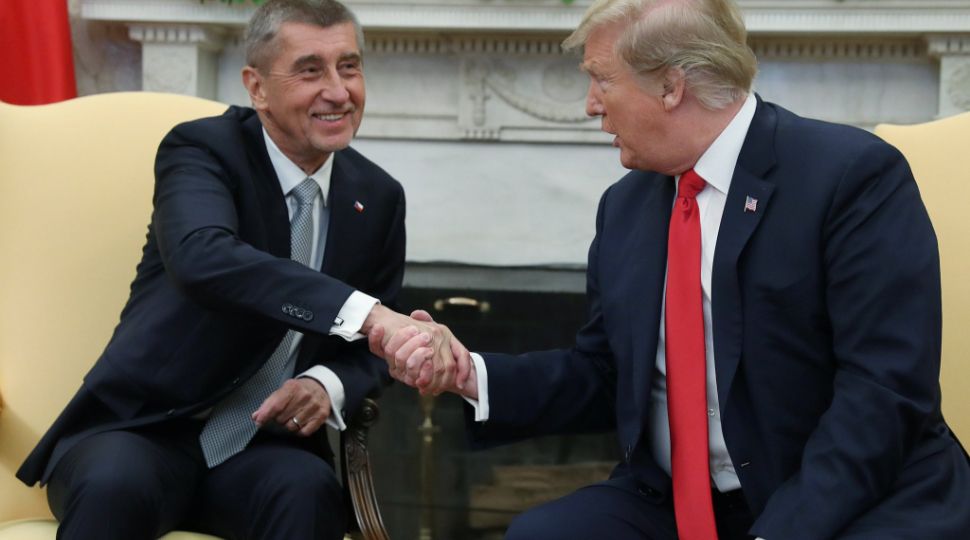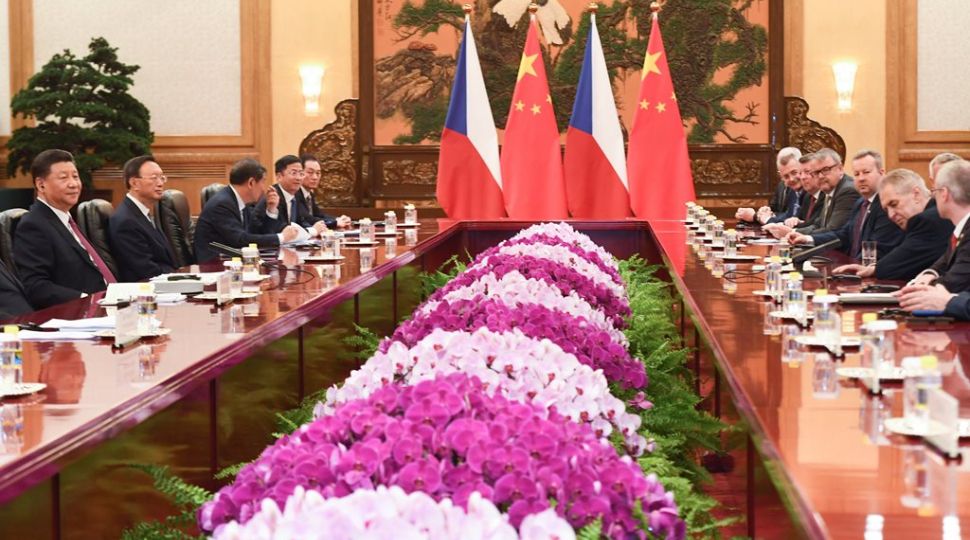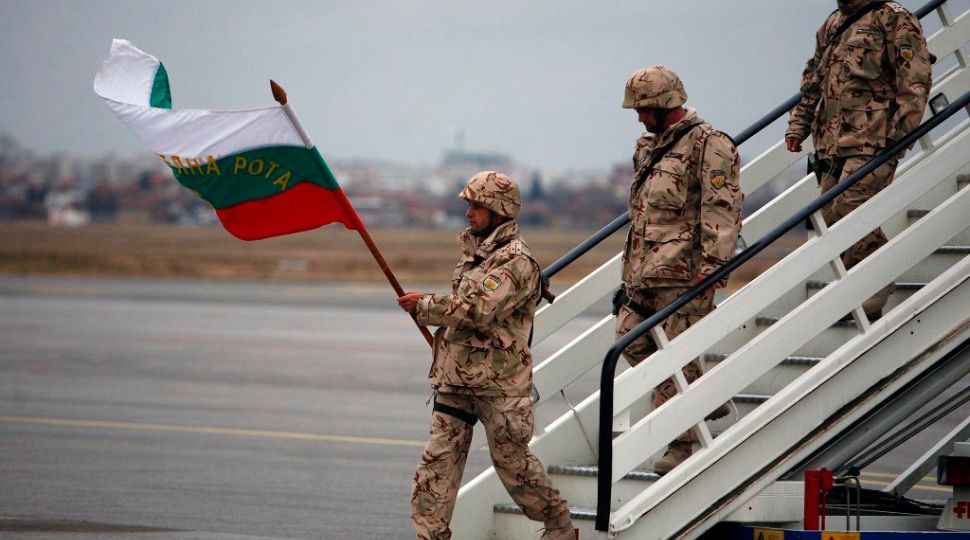Intensification of Czech-U.S. Relations

Picking up the Pace
After a few years’ break in high-level Czech-U.S. contacts, 2019 has seen an intensification. In March, Prime Minister Andrej Babiš met in Washington with President Donald Trump. The last time a sitting PM met the current U.S. president was Petr Nečas and Barack Obama in 2011. Babiš was the first Czech PM to visit the headquarters of the Central Intelligence Agency (CIA) in Langley, Virginia. In February, and for the first time since 2012, a Czech foreign minister, Tomáš Petříček, met with the U.S. Secretary of State, Mike Pompeo.
High-level contacts between the two countries were interrupted by a row over the deployment of elements of the U.S. missile defence system in the Czech Republic and President Miloš Zeman’s policies. Zeman has held the office since 2013 and is a supporter of rapprochement with Russia and China. Despite his endorsement of Trump’s candidacy in the 2016 U.S. election, Zeman has unsuccessfully sought a meeting with the president. With the improving atmosphere in bilateral relations, however, Zeman has a clearly better relationship with the current U.S. ambassador in Prague, Stephen B. King, than with his predecessor, Andrew Schapiro.
Goodwill gestures from the Czech side contributed to the revival of relations. These include the extradition of the Russian hacker Yevgeniy Nikulin to the U.S. after he was detained in the Czech Republic in March last year and blocking in June 2018, together with Romania and Hungary, an EU statement criticizing the transfer of the U.S. embassy from Tel Aviv to Jerusalem. However, probably the key to the improvement in relations was the warning by the Czech security services, including the Security Information Service, against the use of Huawei software and a recommendation to remove the company’s applications from ministry phones and exclude it from public tenders, for example, one for updating the tax portal of the Czech tax authority.
U.S. Interest in the Czech Republic
To curry favour with the Americans, the Czech Republic is using circumstances such as the U.S. attempts to limit China’s influence in Central Europe and on the global development of fifth-generation mobile technologies (5G). The U.S. Department of Justice has already accused Huawei of stealing technology and now wants to cooperate with other countries to counteract the Chinese company’s expansion abroad. Cybersecurity is a key aspect in the development of the 5G network and the U.S. and others allege it may be endangered by Huawei’s involvement. This area is an increasingly visible element of the Czech-U.S. relationship. Cyberthreats from China are the subject of bilateral talks at various levels, for example, in the talks between Foreign Minister Petříček and National Security Advisor John Bolton in February or between representatives of the Czech Ministry of Defence and the U.S. Department of Defense in April. They were also the topic of talks between Babiš and Trump. The U.S. welcomed the international expert conference on 5G network security in May in Prague, hosted by the Czech PM.
The intensification of political contacts between the U.S. and the Czech Republic is also reflected by the growing potential of cooperation in the energy sector, promoted by both the Trump administration and U.S.-based energy companies. The growing importance to the U.S. of energy cooperation with the countries of Central Europe was confirmed by Energy Secretary Rick Perry’s trip to the region, including to the Czech Republic, in November 2018, as well as Perry’s presence during Trump-Babiš meeting in March. The U.S. strives to increase gas exports to the European market and Perry stressed the importance of the Three Seas Initiative to that goal (the Czech Republic participates in the TSI). Currently, the Babiš government is not interested in purchasing gas from the U.S., believing that it is less competitive than Russian supplies and, therefore, supports the Nord Stream 2 gas pipeline. However, after meeting with Trump, Babiš drew attention to the potential of the gas dock at Świnoujście, Poland, in the context of imports of American liquefied gas to Central Europe, which signals the possible verification of such an approach. The Americans are also interested in cooperation in nuclear energy, as seen by Westinghouse’s attempts to win a tender for the expansion of nuclear power plants in the Czech Re Its effort failed in 2014 due to the tender’s cancellation but Westinghouse still delivers fuel for the Temelín power plant reactors.
Czech Expectations of the U.S. An escalation of the trade dispute between the EU and the U.S. is a challenge for the Czech Re The Czechs unequivocally supported the Transatlantic Trade and Investment Partnership (TTIP) because the country is oriented towards export, which in 2018 amounted to 67% of the Czech GDP. That is why the Czech government is wary of Trump’s protectionist stance. Although the U.S. has overall trade turnover of €7.4 billion euros with the Czech Republic (according to 2018 data), it is only the 12th-largest non-EU market for Czech exports. Despite the low level of direct exports of cars to the U.S., the imposition of duties on autos from the EU would negatively affect the Czech economy because of its strong links with the German automotive industry, which is sensitive to U.S. tariffs. That is why in his talks with Trump, Babiš sought to postpone any U.S. decision on this matter until after the formation of the next European Commission (EC). The PM also proposes that the EC should inform the EU members in detail about the course of the negotiations with the U.S. Trump’s conversation with Babiš about economic cooperation (both between the EU and the U.S. and bilaterally) was part of a series of spring meetings at the White House between the American president and the heads of government of other Central European countries—Austria, Slovakia, and Hungary.
In security, the U.S. remains the Czech Republic’s guarantor. In contrast to Poland and the Baltic states, the Czech Republic does not seek to establish a permanent presence of U.S. troops on its territory, but the modernisation plans for its armed forces makes it a partner to the U.S. arms industry. In May, the U.S. State Department responded positively to the Czech government’s request for the purchase of U.S.-made helicopters. Its offer, in turn, made in June, includes the purchase of 12 60M Black Hawk or eight UH-1Y Venom and four AH-1Z Viper helicopters. The U.S. expectations for burden-sharing within the Alliance prompted the government to declare it would spend at least 2% of GDP on defence by 2024. The Czech Republic’s increased commitment to improving security was also seen in the sending of Czech contingents to Lithuania and Latvia to strengthen NATO’s Eastern Flank. In 2018, the Czech Republic decided to increase the number of soldiers in Afghanistan (from 250 to 390) and in Iraq (from 65 to 110).
Conclusions
The intensification of Czech-U.S. relations primarily comes out of the latter’s need to strengthen the group of states seeking to impede China’s technological expansion. The steps taken by the Czech Republic towards Huawei, alongside the intention to buy U.S. helicopters and the increase in engagement in foreign military missions, contribute to a more favourable perception of the country within the American administration. Trade remains a matter of contention and the Czech Republic assesses as negative the Trump administration’s approach to transatlantic trade relations. With the other V4 states in joint declarations, the Czechs refer critically to its protectionist practices.
Despite the Czech governments’ recent declarations, it can be assumed that in the long term the country will at least consider importing liquefied gas from the U.S. as long as it is competitive to Russian gas. Meanwhile, in the context of the diversification of gas sources, also promoted by Poland, and the potential of Central Europe’s role as a recipient of the American LNG, the expansion of connections on the North-South corridor is becoming increasingly important. Another opportunity to strengthen transatlantic relations is the Czech presidency of the Visegrad Group, despite the differences between its members in defining their relations with the U.S. Consultations, announced in a V4+U.S. format, will concern energy, trade, and the innovation economy.





